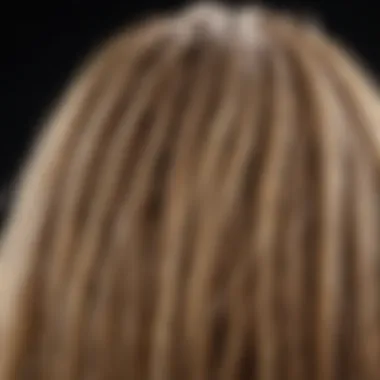Ultimate Guide to Conditioners for Very Dry Hair


Intro
Hair dryness is a common issue many individuals face, leading to a range of problems such as frizz, breakage, and lackluster appearance. Understanding the underlying causes of very dry hair is crucial for developing effective care regimens. Factors such as weather, heat styling, chemical treatments, and improper washing techniques all contribute to this condition. To address these concerns, selecting the right conditioner is essential. A well-formulated conditioner can provide the moisture and nutrients that dry hair desperately needs. This guide aims to clarify which conditioners are best suited for very dry hair by exploring their compositions, effectiveness, and specific ingredients that promote hair health.
Factors Contributing to Hair Dryness
Dry hair can result from numerous elements:
- Environmental Factors: High temperatures or low humidity can dehydrate hair.
- Chemical Treatments: Frequent coloring, relaxing, or perming causes significant damage.
- Heat Styling: Tools such as flat irons and blow dryers can strip moisture.
- Improper Wash Routine: Excessive washing or using harsh shampoos can worsen dryness.
Recognizing these factors is the first step in reversing the effects of hair dryness.
Key Ingredients for Nourishing Nourished Hair
Conditioners vary in formulation, but effective ones have specific key ingredients:
- Glycerin: A humectant that draws moisture into the hair.
- Natural Oils: Coconut oil, argan oil, and jojoba oil provide hydration and protection.
- Proteins: Hydrolyzed silk or keratin can strengthen and repair damaged hair.
- Fatty Acids: Such as from shea butter or avocado oil, they help in sealing moisture.
These ingredients can dramatically improve the moisture-retention of dry hair.
"Choosing a conditioner that contains the right ingredients is essential for restoring dry hair to a healthier state."
Assessing Conditions and Hair Types
Before selecting a conditioner, it's vital to understand your hair type. Some conditioners are specifically designed for fine, coily, or straight hair. Conducting a patch test or trial-and-error regime may be necessary to find the most suitable product.
Product Recommendations
While personal preferences play a significant role, several popular conditioners have gained acclaim:
- Olaplex No. 5 Bond Maintenance Conditioner: Known for restoring moisture and repairing damage.
- SheaMoisture Raw Shea Butter Restorative Conditioner: This product excels in hydration.
- Moroccanoil Moisture Repair Conditioner: Enriched with argan oil for deep conditioning.
Evaluate these based on your unique hair needs and preferences for optimal results.
Prologue to Hair Dryness
Hair dryness is a common concern for many individuals, and understanding it is essential for effective hair care. The quality of hair directly impacts not just its appearance but also overall confidence. When hair becomes dry, it often looks dull, frizzy, and brittle, which can be frustrating. This section will explore why hair can become dry and how it connects to the need for a good conditioner.
A major factor in hair dryness is the type and texture of hair. Curly, wavy, and coarse hair types are more prone to dryness due to their structure. The natural oils produced by the scalp have a harder time traveling down the hair shaft. Therefore, recognizing one's hair type is crucial for selecting the right products.
Additionally, external factors such as weather, heat styling, and chemical treatments can exacerbate hair dryness. For instance, exposure to sun, wind, and humidity can strip away moisture. Understanding these causes allows individuals to tailor their hair care routines more effectively.
This segment emphasizes the importance of being aware of both the intrinsic and extrinsic factors that contribute to hair dryness. With this knowledge, one can make informed choices about hair conditioners and treatments that specifically target these issues.
The Role of Conditioners in Hair Care
Conditioners play a crucial role in maintaining healthy hair, especially for those dealing with very dry and brittle strands. Their primary function is to restore moisture to the hair, which is essential for elasticity and overall appearance. Conditioners work by coating the hair shaft, making it smoother and more manageable. This article delves into why conditioners are vital in hair care routines and how they can revive and repair dry hair effectively.
Why Conditioners Matter
Conditioners are not merely a supplementary product; they are a necessity. They provide benefits such as detangling, reducing frizz, and improving hair's shine and softness. Their unique formulations contain humectants and topical agents that trap moisture within the hair fibers, resulting in noticeable hydration.
Furthermore, using conditioners regularly can protect hair from environmental factors like heat, pollution, and dryness caused by styling tools. For individuals with very dry hair, incorporating a suitable conditioner can mean the difference between lifeless locks and vibrant, healthy strands.


Types of Conditioners
Choosing the right type of conditioner is essential in addressing specific hair needs. Here, we will discuss three prominent types of conditioners available in the market and their respective contributions to hair care:
Rinse-out Conditioners
Rinse-out conditioners are designed to be applied after shampooing and rinsed out shortly after use. They typically have a lightweight formula, making them ideal for daily use. One specific aspect of rinse-out conditioners is their immediate effect on the hair. They provide instant hydration and are beneficial for maintaining overall hair health.
A key characteristic of rinse-out conditioners is their ability to detangle hair, reducing breakage during styling. However, rinse-out options may not provide the deep moisture required for severely dry hair. They serve best as a preventive measure rather than a treatment for existing dryness.
Leave-in Conditioners
Leave-in conditioners are formulated to be applied and left on the hair without rinsing. This type allows for prolonged exposure to hydrating ingredients. The specific aspect of leave-in conditioners is their chance to work throughout the day. They offer continuous moisture, which can benefit those with extremely dry hair.
A standout feature of leave-in conditioners is that they can also act as a styling product. They help to control frizz and add softness without weighing hair down. However, it's important to avoid overuse, as too much product could lead to buildup or greasy-looking hair.
Deep Conditioners
Deep conditioners provide intensive hydration and repair for very dry or damaged hair. This type is usually recommended for weekly use, and the application is left on for a longer period. The specific aspect of deep conditioners is their ability to penetrate the hair shaft more deeply, often resulting in dramatic improvements in hair texture and health.
A key characteristic is their rich, thick consistency, which often includes potent nourishing ingredients. Deep conditioners are particularly benificial in addressing severe damage but can be time-intensive. Users should follow the directions closely to avoid over-conditioning, which can lead to limp hair.
In summary, understanding the role of conditioners and recognizing their various types is paramount for achieving healthy hair. Each type serves a distinct purpose, ensuring that individuals can tailor their hair care routine to their unique needs. Selecting the appropriate conditioner type, be it rinse-out, leave-in, or deep conditioning, can significantly enhance the effectiveness of any hair care regimen.
Key Ingredients for Hydration
Understanding the key ingredients for hydration is essential when selecting conditioners for very dry hair. These components play a significant role in restoring moisture, enhancing elasticity, and providing overall nourishment to the hair.
Natural Oils and Their Benefits
Natural oils are often at the forefront of hydrating agents due to their rich nutrient profiles and ability to penetrate the hair shaft. Here are some key natural oils:
Argan Oil
Argan oil is sourced from the nuts of the argan tree in Morocco. Its high content of fatty acids makes it a powerful hydrator. Argan oil is well-known for its conditioning properties, which can help to soften and smooth dry hair.
A unique characteristic of argan oil is its rich vitamin E content, which provides additional protection against environmental damage. However, some users may find it slightly heavy, especially on fine hair, leading to a greasy appearance if overused.
Coconut Oil
Coconut oil stands out due to its ability to penetrate the hair shaft better than many other oils. This characteristic allows it to deeply hydrate and nourish the hair from within. Its antifungal properties can also help maintain a healthy scalp.
The primary benefit of coconut oil lies in its lauric acid composition, which helps reduce protein loss in hair. Yet, it can be too heavy for some hair types, leading to buildup if not washed out properly.
Jojoba Oil
Jojoba oil is technically a wax ester and closely resembles the natural sebum produced by our skin. Its unique structure allows it to easily absorb into the hair and scalp without leaving a heavy residue.
Jojoba oil's light texture makes it suitable for all hair types, including fine hair. It helps to balance moisture levels and promote hair growth, but it may not provide the deep conditioning some others offer.
Hydrating Agents in Conditioners
Hydrating agents are crucial in effective conditioners. These ingredients specifically target hydration and help to maintain moisture levels in hair. Their attributes can vary significantly.


Glycerin
Glycerin is hygroscopic, meaning it draws moisture from the environment into the hair. This capacity can provide extensive hydration to very dry hair, making it feel softer and healthier after use.
Glycerin's key feature is its ability to improve moisture retention. It is a popular choice in hair care products for this reason. However, in low humidity environments, it may have the opposite effect, potentially drawing moisture away from hair.
Aloe Vera
Aloe vera is not just for soothing sunburns; its properties extend to hair care as well. Known for its soothing and moisturizing qualities, aloe vera helps restore hair's natural moisture balance.
The gel form of aloe vera contains enzymes that promote healthy hair growth and prevent breakage. While aloe vera is generally beneficial, some might find it slightly sticky if used in excessive amounts.
Silicones
Silicones are often found in conditioners for their conditioning and smoothing properties. They form a protective layer over hair strands, helping to lock in moisture and impart a shiny finish.
A unique feature of silicones is their ability to reduce frizz and provide slip, making it easier to detangle hair. Nonetheless, buildup can occur when using products with certain silicones, which may require more clarifying washes if used frequently.
In summary, each of these ingredients has its own set of advantages and disadvantages. Understanding these can guide consumers to make informed choices that cater to their specific hair needs.
Evaluating the Best Conditioners for Very Dry Hair
When it comes to very dry hair, selecting the right conditioner can significantly impact its overall health and appearance. This section aims to highlight the essential factors that contribute to the efficacy of a conditioner, guiding readers in making informed choices. The right conditioner can restore moisture, improve texture, and enhance manageability. By critically evaluating various options, we can identify solutions tailored specifically to meet the unique needs of dry hair. Understanding what makes a conditioner effective leads to better outcomes in hair care routines.
Criteria for Choosing a Conditioner
Choosing a conditioner for very dry hair involves analyzing several key criteria. These include:
- Moisturizing Ingredients: Look for hydrators such as glycerin, natural oils, and aloe vera, which help maintain hair hydration.
- Consistency and Texture: Thicker formulas often provide more hydration and sealing properties, beneficial for dry hair.
- Compatibility with Hair Type: A suitable conditioner must align with individual hair needs, whether coarse, fine, or chemically treated.
- pH Balance: A conditioner that maintains a balanced pH can help protect the hair cuticle, enhancing shine and smoothness.
- Brand Reputation and Reviews: Researching user testimonials can provide insights into the product's effectiveness.
Considering these factors will aid in selecting a conditioner that not only nourishes but also protects hair from environmental damage.
Top Recommended Conditioners
Conditioner A Description
Conditioner A is a popular choice among those with very dry hair. This product focuses on providing deep hydration right from the first use. Its key characteristic is the inclusion of organic coconut oil, which is known for its ability to penetrate the hair shaft effectively. Coconut oil helps reduce protein loss, making hair stronger. The unique feature of Conditioner A is its paraben-free formula, which appeals to those seeking cleaner beauty alternatives. However, while it is beneficial for moisture retention, its thicker texture may weigh down fine hair.
Conditioner B Description
Conditioner B is another great option, designed specifically for dry and damaged hair. Its formulation includes aloe vera and shea butter, known for their rich moisturizing properties. The essential ingredient of this conditioner is shea butter, which enhances elasticity in hair strands. This conditioner is also lightweight, avoiding greasiness, making it suitable for daily use. Though it is well-received, some users may find that they require a leave-in product for optimal hydration results.
Conditioner Description
Conditioner C is known for its advanced hydration technology, which claims to lock in moisture for an extended period. This product features a blend of jojoba oil and silicones that create a protective barrier around each strand. This barrier not only nourishes but also prevents further moisture loss. As a result, many users favor this conditioner for both its effectiveness and pleasant scent. However, those sensitive to silicones might want to consider alternatives.
In summary, assessing these conditioners offers a varied approach to addressing very dry hair. Understanding specific attributes allows individuals to fine-tune their hair care regimen for healthier locks.
Application Techniques for Maximum Effectiveness
Understanding the proper application techniques for conditioners is vital for achieving optimal results, particularly for very dry hair. Conditioners, even the best ones, can fail to deliver their benefits if not applied correctly. Poor application can lead to uneven distribution, leaving some areas over-treated and others neglected. This section will explore various methods to ensure your conditioner treatment is both effective and efficient.
How to Apply Conditioner Properly


Applying conditioner in the right manner maximizes its hydrating properties. First, hair should be thoroughly rinsed to remove shampoo residue before using conditioner. After shampooing, gently squeeze excess water from the hair. This prevents dilution of the conditioner and enhances its adherence.
- Divide Your Hair: Start by sectioning your hair into manageable parts. This ensures even distribution.
- Use the Right Amount: The amount of conditioner depends on your hair length and thickness. Generally, a quarter-sized amount works for medium length hair. Adjust accordingly, as too much can weigh your hair down.
- Apply it to the Ends First: Focus on the ends of your hair where it tends to be drier. Use your fingers or a wide-tooth comb to distribute the product evenly. Work your way up towards the roots, minimizing application on the scalp to avoid greasiness.
- Let it Sit: Allow the conditioner to absorb for several minutes. This waiting time can greatly improve effectiveness. Some conditioners suggest specific time frames; following those can yield better hydration.
- Rinse Thoroughly: Finally, rinse with cool water. This helps seal the moisture and enhances shine.
By ensuring a comprehensive application process, the conditioner can penetrate and hydrate the hair strands more efficiently.
Frequency of Use
Determining how often to use conditioner is essential for maintaining healthy and well-hydrated hair. Over-conditioning can lead to buildup, while under-conditioning may leave hair dry and frizzy.
- For very dry hair, using a conditioner after every wash is often recommended, particularly if you wash your hair frequently.
- If you wash your hair less often, consider deep conditioning once a week to maintain moisture levels.
- Pay attention to how your hair responds to different frequencies. If you notice buildup or greasiness, it may be beneficial to reduce application frequency.
Overall, customizing the application frequency based on individual hair requirements promotes long-term health and vitality.
Hair care is not one-size-fits-all; it reflects both your unique hair type and your lifestyle choices.
Common Mistakes to Avoid
When trying to manage very dry hair, it's essential to recognize common mistakes that can counteract your efforts. This section highlights pitfalls that can arise during hair care routines. Understanding these issues can help promote healthier hair, enhancing the effectiveness of conditioners, and ultimately leading to better results.
Over-conditioning Issues
Over-conditioning might seem like a harmless gesture, but it can lead to significant drawbacks. While conditioners are vital for maintaining moisture, using too much can cause hair to become heavy and limp, undermining the benefits you seek. Excess buildup from frequent application can lead to lackluster hair, which may appear dull and lifeless. Additionally, hair may feel greasy rather than hydrated.
To avoid this mistake, consider the following guidelines:
- Assess Your Hair Needs: Not all hair is the same. Some individuals may require less conditioning to achieve optimal results.
- Limit Product Use: Using a smaller amount of conditioner can still provide adequate moisture without leading to over-conditioning.
- Choose Wisely: Selecting a conditioner specifically designed for dry hair may address the hydration needs without overwhelming the hair.
Making small adjustments in the amount and frequency of product application can lead to noticeable improvements in hair health.
Ignoring Other Hair Care Practices
Conditioners are just one part of a successful hair care regimen. Ignoring complementary practices can hinder the overall effectiveness of your chosen products. Hydration does not solely stem from conditioners; it also comes from other essential hair care steps.
Neglecting these aspects can diminish the positive outcomes of your conditioning efforts. Here are important considerations:
- Shampoo Selection: Using harsh shampoos can strip hair of natural oils, leading to increased dryness. Opt for sulfate-free or moisturizing shampoos.
- Diet and Hydration: Nourishing hair starts from within. A balanced diet and sufficient water intake contribute to overall hair health.
- Heat Protection: Protecting hair from heat styling tools is crucial. Heat can exacerbate dryness, leading to further damage.
- Regular Trims: Split ends can make hair appear drier. Routine trims keep hair healthy and manageable.
It is vital to view conditioner use as a part of a wider routine. A holistic approach can lead to improved hair vitality.
Maintaining a comprehensive hair care routine is essential to combat very dry hair.
Recognizing and avoiding common mistakes is crucial in your journey toward healthier hair. These insights will set the stage for a more effective use of conditioners, leading to improved outcomes.
Ending and Recommendations
In this section, we will distill the key points regarding the best conditioners for very dry hair. Understanding the right conditioner for your hair type is crucial. Dry hair can lead to various issues such as brittleness, frizz, and lackluster appearance. Thus, choosing an appropriate conditioner can significantly improve hair health.
When selecting a conditioner, consider both the ingredients and the hair’s unique needs. Look for products enriched with hydrating agents and natural oils that can provide moisture and nourishment. Ingredients like argan oil and glycerin are essential for restoring moisture. Avoiding common mistakes, such as over-conditioning or neglecting other hair care practices, can maximize benefits.
Summary of Findings
The analysis of various conditioners reveals that not all products are created equal. A conditioner that works well for one person might not achieve the same results for another. The right choice depends on specific hair types and concerns. Key findings include:
- Conditioner types play a significant role: Rinse-out, leave-in, and deep conditioners serve different purposes.
- Hydrating ingredients are imperative for maintaining moisture balance.
- Regular use, along with correct application techniques, can enhance conditioning effects.
Ultimately, understanding how to assess and choose these products is key in combating very dry hair. It is not merely about selecting a popular brand but finding what aligns best with your hair's condition.
Final Thoughts on Hair Care Routine
As you develop your hair care regimen, incorporate these insights about conditioners into your daily routine. Establish an ongoing regimen that prioritizes moisture and nourishment. Pay attention to your hair's response and adjust usage frequency as necessary.
Furthermore, consider integrating complementary products that support hydration, such as shampoos formulated for dry hair. Educate yourself on the specific needs of your hair and make decisions based on well-researched options rather than marketing gimmicks.
The journey to repair very dry hair requires patience and consistent effort. By following these recommendations, you can effectively improve hair texture and appearance. Make informed choices and embrace a hair care routine that nurtures and revitalizes.



